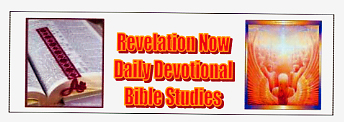
| Next | Previous | Index | Tellout Home |
34. Censer Angel
Revelation 8.5-9
"Then the angel took the censer, filled it with altar fire, and hurled it on the earth, and there came thunder peals, rumblings, lightning flashes, and an earthquake. The first angel sounded his trumpet, and there came hail and fire mixed with blood, and the angel hurled it down on the earth. A third of the earth, the trees, and all the green grass burned up. The second angel sounded his trumpet and threw something like a huge blazing mountain into the sea. A third of the sea turned into blood, a third of the sea's living creatures died, and a third of the ships destroyed." (Revelation 8.5-9) ✞
Altar Coals
 Before the universe's creation, Angels acted as messengers, ministers, and guardians to Almighty God. This Revelation angel, who was a spiritual rather than a human being, took the censer. The angel filled this burner for solid incense with altar coals and dashed it on the ground. Leviticus 6.12-13 describes the Jerusalem Temple's altars, "The altar fire must not go out. Every morning the priest adds firewood, arranges the burnt offering, and burns the fellowship offerings' fat." "Three separate wood piles are on top of it. The largest of these burns all the sacrifice portions. The second fire provides the incense altar coals within the sanctuary. The third is the "perpetual fire," which constantly burns on the altar." The incense altar does not receive any sacrifice, and they take no coals from it. It exists solely to fulfill the commandment that there be a permanent fire burning in the Temple. The Persians called this "permanent fire" the "Orismada" or "continual holy fire," and they would carry it solemnly before the king in public ceremonies. There was no commandment regarding the wood type used on the altar except that the Rabbis forbade olive wood and grapevine wood, as these do not burn well and need to be conserved because of their commercial value. ✞
Before the universe's creation, Angels acted as messengers, ministers, and guardians to Almighty God. This Revelation angel, who was a spiritual rather than a human being, took the censer. The angel filled this burner for solid incense with altar coals and dashed it on the ground. Leviticus 6.12-13 describes the Jerusalem Temple's altars, "The altar fire must not go out. Every morning the priest adds firewood, arranges the burnt offering, and burns the fellowship offerings' fat." "Three separate wood piles are on top of it. The largest of these burns all the sacrifice portions. The second fire provides the incense altar coals within the sanctuary. The third is the "perpetual fire," which constantly burns on the altar." The incense altar does not receive any sacrifice, and they take no coals from it. It exists solely to fulfill the commandment that there be a permanent fire burning in the Temple. The Persians called this "permanent fire" the "Orismada" or "continual holy fire," and they would carry it solemnly before the king in public ceremonies. There was no commandment regarding the wood type used on the altar except that the Rabbis forbade olive wood and grapevine wood, as these do not burn well and need to be conserved because of their commercial value. ✞
Peals of Thunder
 Casting fire on the earth introduces "peals of thunder, rumblings, lightning flashes, and an earthquake," the curtain-raisers to more terrors. This word picture reminds us of the Ezekiel 10.2 vision, "The Lord said to the linen clothed man, 'Go in among the wheels beneath the cherubim. Fill your hands with burning coals from among the cherubim and scatter them over the city.' As I watched, he went in." In Revelation, a linen-clothed man, who may have been the same censor angel, takes coals from between the cherubim or winged angelic beings and scatters them over the city. Fire and burning coals are also associated with the Isaiah 6.6 vision, "Then one of the seraphim flew to me with a live coal in his hand, which he had taken with tongs from the altar." The prophet's lips were touched with the fire's burning ember so that he might speak for God. ✞
Casting fire on the earth introduces "peals of thunder, rumblings, lightning flashes, and an earthquake," the curtain-raisers to more terrors. This word picture reminds us of the Ezekiel 10.2 vision, "The Lord said to the linen clothed man, 'Go in among the wheels beneath the cherubim. Fill your hands with burning coals from among the cherubim and scatter them over the city.' As I watched, he went in." In Revelation, a linen-clothed man, who may have been the same censor angel, takes coals from between the cherubim or winged angelic beings and scatters them over the city. Fire and burning coals are also associated with the Isaiah 6.6 vision, "Then one of the seraphim flew to me with a live coal in his hand, which he had taken with tongs from the altar." The prophet's lips were touched with the fire's burning ember so that he might speak for God. ✞
Archangels' Names
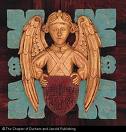 The Revelation censer angel brings coals to represent new woes. "The saints' prayers return to the earth in wrath," writes the Biblical scholar H. B. Swete (1835-1917). The saints cry out to this angel for vengeance upon those who have tortured and killed them. "The seven angels" are known as "the presence angels" and are sometimes thought to be the seven archangels' names. According to Enoch and Tobit 12.15, the traditional names of the seven archangels (or Princes) are "Uriel, Raphael, Raguel, Michael, Saraqael, Gabriel, and Remiel." Some of the names vary depending upon the source. Some scholars link the seven archangels to the seven days of the week or the seven classical planets visible to the naked eye. Apart from these names, we know little about these archangels except for Gabriel and Michael's appearance in the New Testament. There are seven, a symbolically complete number, mentioned in these old texts. These "presence angels" enjoy the unique honor of being close to God himself. In an Asian court, only the most favored courtiers have the right to remain in the king's presence. To be a courtier was a special honor. It meant exclusive rewards and immediate readiness for the king to dispatch you on an errand or service elsewhere. We, too, should aspire to be "presence angels" on earth, ready to go without a moment's hesitation at our Lord's command! ✞
The Revelation censer angel brings coals to represent new woes. "The saints' prayers return to the earth in wrath," writes the Biblical scholar H. B. Swete (1835-1917). The saints cry out to this angel for vengeance upon those who have tortured and killed them. "The seven angels" are known as "the presence angels" and are sometimes thought to be the seven archangels' names. According to Enoch and Tobit 12.15, the traditional names of the seven archangels (or Princes) are "Uriel, Raphael, Raguel, Michael, Saraqael, Gabriel, and Remiel." Some of the names vary depending upon the source. Some scholars link the seven archangels to the seven days of the week or the seven classical planets visible to the naked eye. Apart from these names, we know little about these archangels except for Gabriel and Michael's appearance in the New Testament. There are seven, a symbolically complete number, mentioned in these old texts. These "presence angels" enjoy the unique honor of being close to God himself. In an Asian court, only the most favored courtiers have the right to remain in the king's presence. To be a courtier was a special honor. It meant exclusive rewards and immediate readiness for the king to dispatch you on an errand or service elsewhere. We, too, should aspire to be "presence angels" on earth, ready to go without a moment's hesitation at our Lord's command! ✞
Angel Trumpet Blasts
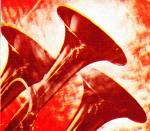 Thunder, lightning, and an earthquake accompany the angel's seventh trumpet blast. Great things are about to happen in heaven. In Old Testament and New Testament visions, seven angel trumpets blown one at a time are signs of God's intervention in history. The "Angel trumpet blast" was like a smoke alarm that awakens us from sleep or warns us of danger. "God's trumpet" will sound when Christ returns. 1 Thessalonians 4.16 tells us, "For the Lord himself will come down from heaven, with a loud command, with the archangel's voice and God's trumpet call, and the dead in Christ will rise first." In Matthew 24.31, we also read, "And he will send his angels with a loud trumpet call, and they will gather his elect from the four winds, from one end of the heavens to the other." God finally gathers in the elect. These trumpet' images remind us of Mount Sinai's scene when Moses gives God's Law to the people. We read in Exodus 19.16, "On the third day's morning there was thunder and lightning, with a thick mountain cloud over, and a loud trumpet blast. Everyone in the camp trembled." The law was given to Moses and then to the people accompanied by a great trumpet blast of thunder, and lightning, enveloped in a thick mountain-top cloud. ✞
Thunder, lightning, and an earthquake accompany the angel's seventh trumpet blast. Great things are about to happen in heaven. In Old Testament and New Testament visions, seven angel trumpets blown one at a time are signs of God's intervention in history. The "Angel trumpet blast" was like a smoke alarm that awakens us from sleep or warns us of danger. "God's trumpet" will sound when Christ returns. 1 Thessalonians 4.16 tells us, "For the Lord himself will come down from heaven, with a loud command, with the archangel's voice and God's trumpet call, and the dead in Christ will rise first." In Matthew 24.31, we also read, "And he will send his angels with a loud trumpet call, and they will gather his elect from the four winds, from one end of the heavens to the other." God finally gathers in the elect. These trumpet' images remind us of Mount Sinai's scene when Moses gives God's Law to the people. We read in Exodus 19.16, "On the third day's morning there was thunder and lightning, with a thick mountain cloud over, and a loud trumpet blast. Everyone in the camp trembled." The law was given to Moses and then to the people accompanied by a great trumpet blast of thunder, and lightning, enveloped in a thick mountain-top cloud. ✞
The Last Trumpet
 The angel trumpets may have been like Moses' silver trumpets in Numbers 10.2, "Make two trumpets of hammered silver, and use them for calling the community together and for having the camps set out." The Greek word for trumpet is "salpingosor" or "salpinx," a straight, narrow bronze (or silver) tube with a mouthpiece and a bell. A similar and beautiful silver and gold plated and engraved trumpet and its wooden mute appeared in the Tomb of Tutankhamun (1326–1336 BC.) Ancient trumpets do not resemble modern musical instruments for signaling or as a warning like a bugle. The player produces the horn's buzzing sound by blowing air through partly closed lips. The ancient Hebrews' traditional sacred horns are called "shofars" and made out of a ram's horn. Trumpets became a permanent part of the "Day of the Lord" apparatus, and the great trumpet will summon back exiles from every land. ✞
The angel trumpets may have been like Moses' silver trumpets in Numbers 10.2, "Make two trumpets of hammered silver, and use them for calling the community together and for having the camps set out." The Greek word for trumpet is "salpingosor" or "salpinx," a straight, narrow bronze (or silver) tube with a mouthpiece and a bell. A similar and beautiful silver and gold plated and engraved trumpet and its wooden mute appeared in the Tomb of Tutankhamun (1326–1336 BC.) Ancient trumpets do not resemble modern musical instruments for signaling or as a warning like a bugle. The player produces the horn's buzzing sound by blowing air through partly closed lips. The ancient Hebrews' traditional sacred horns are called "shofars" and made out of a ram's horn. Trumpets became a permanent part of the "Day of the Lord" apparatus, and the great trumpet will summon back exiles from every land. ✞
Trumpets will Sound
 As we read in Isaiah 27.13, "and on that day, a great trumpet will sound. Those perishing in Assyria and those exiled in Egypt will come and worship the Lord on Jerusalem's holy mountain." Seven trumpets sound on the Day of the Lord in Zion. Joel 2.1 gives us the last days' picture in these Old Testament visions, "Blow Zion's trumpet; sound my holy hill alarm. Let all who live in the land tremble, for the Lord's day is coming. It is close at hand." Saint Paul also speaks about the last trumpet in 1 Corinthians 15.51-52 "Listen, I tell you a mystery. We will not all sleep, but we will all change in a flash, in an eye's twinkling, at the last trumpet. For the trumpet will sound, the dead will rise imperishable, and God will change us." ✞
As we read in Isaiah 27.13, "and on that day, a great trumpet will sound. Those perishing in Assyria and those exiled in Egypt will come and worship the Lord on Jerusalem's holy mountain." Seven trumpets sound on the Day of the Lord in Zion. Joel 2.1 gives us the last days' picture in these Old Testament visions, "Blow Zion's trumpet; sound my holy hill alarm. Let all who live in the land tremble, for the Lord's day is coming. It is close at hand." Saint Paul also speaks about the last trumpet in 1 Corinthians 15.51-52 "Listen, I tell you a mystery. We will not all sleep, but we will all change in a flash, in an eye's twinkling, at the last trumpet. For the trumpet will sound, the dead will rise imperishable, and God will change us." ✞
Coming Judgments
 In Revelation, each of the first and second angels' trumpet blasts sounds out upon the earth as coming judgment signals. The trumpet sound always denotes military strength. It is, therefore, an instrument to signal directions in battle, to advance or retreat. God still sounds his warnings to human ears. It may also be like the trumpet fanfare, which announces royalty's arrival. An angel trumpet blast is a fitting symbol to express the King of Eternity's coming. In Revelation 8, all kinds of devastations take place and destroy a third of ships. A trumpet blast alarm could also be a battle summons. God is always summoning us to stand up for truth and become the King of Kings' soldiers. "The trumpet" marks God's active involvement in punishing the world's evil. Here, we have a picture of nature's elemental forces hurled in judgment against the world. ✞
In Revelation, each of the first and second angels' trumpet blasts sounds out upon the earth as coming judgment signals. The trumpet sound always denotes military strength. It is, therefore, an instrument to signal directions in battle, to advance or retreat. God still sounds his warnings to human ears. It may also be like the trumpet fanfare, which announces royalty's arrival. An angel trumpet blast is a fitting symbol to express the King of Eternity's coming. In Revelation 8, all kinds of devastations take place and destroy a third of ships. A trumpet blast alarm could also be a battle summons. God is always summoning us to stand up for truth and become the King of Kings' soldiers. "The trumpet" marks God's active involvement in punishing the world's evil. Here, we have a picture of nature's elemental forces hurled in judgment against the world. ✞
Earth, Sea, and Rivers
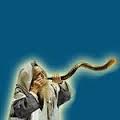 One at a time, seven trumpets sound to cue apocalyptic events. John of Patmos describes the detailed events that follow. At each angel trumpet blast, an attack happens in a different part of the world. The following destruction is not total, for this is only the prelude to the end. The destruction blast falls on the earth, then the sea, then the freshwater rivers and springs, and later the heavens. Every part of the created universe feels destruction's tide. ✞
One at a time, seven trumpets sound to cue apocalyptic events. John of Patmos describes the detailed events that follow. At each angel trumpet blast, an attack happens in a different part of the world. The following destruction is not total, for this is only the prelude to the end. The destruction blast falls on the earth, then the sea, then the freshwater rivers and springs, and later the heavens. Every part of the created universe feels destruction's tide. ✞
Blood Rain
 The first angel pours out blood mixed with rain on the earth. Similar well-documented occurrences have happened elsewhere. As we so often see, John of Patmos' understands his visions in the light of his own life experiences. John may recall the blood rain from actual events he had seen or heard about in that part of the ancient Near Eastern world. Some Southern Mediterranean countries such as Spain, Italy, or Morocco have reported it more than once. In 2014, a mild red blood rain descended like a thick smog engulfing parts of England, notably Liverpool. Many people suffered from breathing difficulties as a result. ✞
The first angel pours out blood mixed with rain on the earth. Similar well-documented occurrences have happened elsewhere. As we so often see, John of Patmos' understands his visions in the light of his own life experiences. John may recall the blood rain from actual events he had seen or heard about in that part of the ancient Near Eastern world. Some Southern Mediterranean countries such as Spain, Italy, or Morocco have reported it more than once. In 2014, a mild red blood rain descended like a thick smog engulfing parts of England, notably Liverpool. Many people suffered from breathing difficulties as a result. ✞
Red Sahara Sand
 There is also a record of blood-red rain in Italy in 1901. The reports say that "fine red sand was blown from the Sahara Desert caught up into the upper air, then when the rain came, the fine red sand particles descended with the rain and looked just like blood." These high air currents carry sand from the Sahara across Europe, the Atlantic Ocean, Canada, and the United States. We have no immediate explanation for the additional elements of hail and fire mixed with blood which appear to be part of Revelation's supernatural origin. ✞
There is also a record of blood-red rain in Italy in 1901. The reports say that "fine red sand was blown from the Sahara Desert caught up into the upper air, then when the rain came, the fine red sand particles descended with the rain and looked just like blood." These high air currents carry sand from the Sahara across Europe, the Atlantic Ocean, Canada, and the United States. We have no immediate explanation for the additional elements of hail and fire mixed with blood which appear to be part of Revelation's supernatural origin. ✞
Hail in Egypt
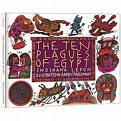 Only once before, during Egypt's ten plagues in the seventh hail plague, do we encounter a similar calamity caused by frozen rain. Exodus 9.23-26 says, "When Moses stretched out his staff toward the sky, the Lord sent thunder, hail, and lightning flashes down to the ground. So the Lord rained hail on Egypt's land, and lightning flashed back and forth. It was the worst storm in Egypt since it had become a nation. Throughout Egypt, the hail struck everything in the fields - both people and animals. It beat down everything growing and stripped every tree. The only place it did not hail was Goshen's land, where the Israelites were." ✞
Only once before, during Egypt's ten plagues in the seventh hail plague, do we encounter a similar calamity caused by frozen rain. Exodus 9.23-26 says, "When Moses stretched out his staff toward the sky, the Lord sent thunder, hail, and lightning flashes down to the ground. So the Lord rained hail on Egypt's land, and lightning flashed back and forth. It was the worst storm in Egypt since it had become a nation. Throughout Egypt, the hail struck everything in the fields - both people and animals. It beat down everything growing and stripped every tree. The only place it did not hail was Goshen's land, where the Israelites were." ✞
"Censer Angel"
by Ron Meacock © 2021
| ^Top Page | Next | Previous |